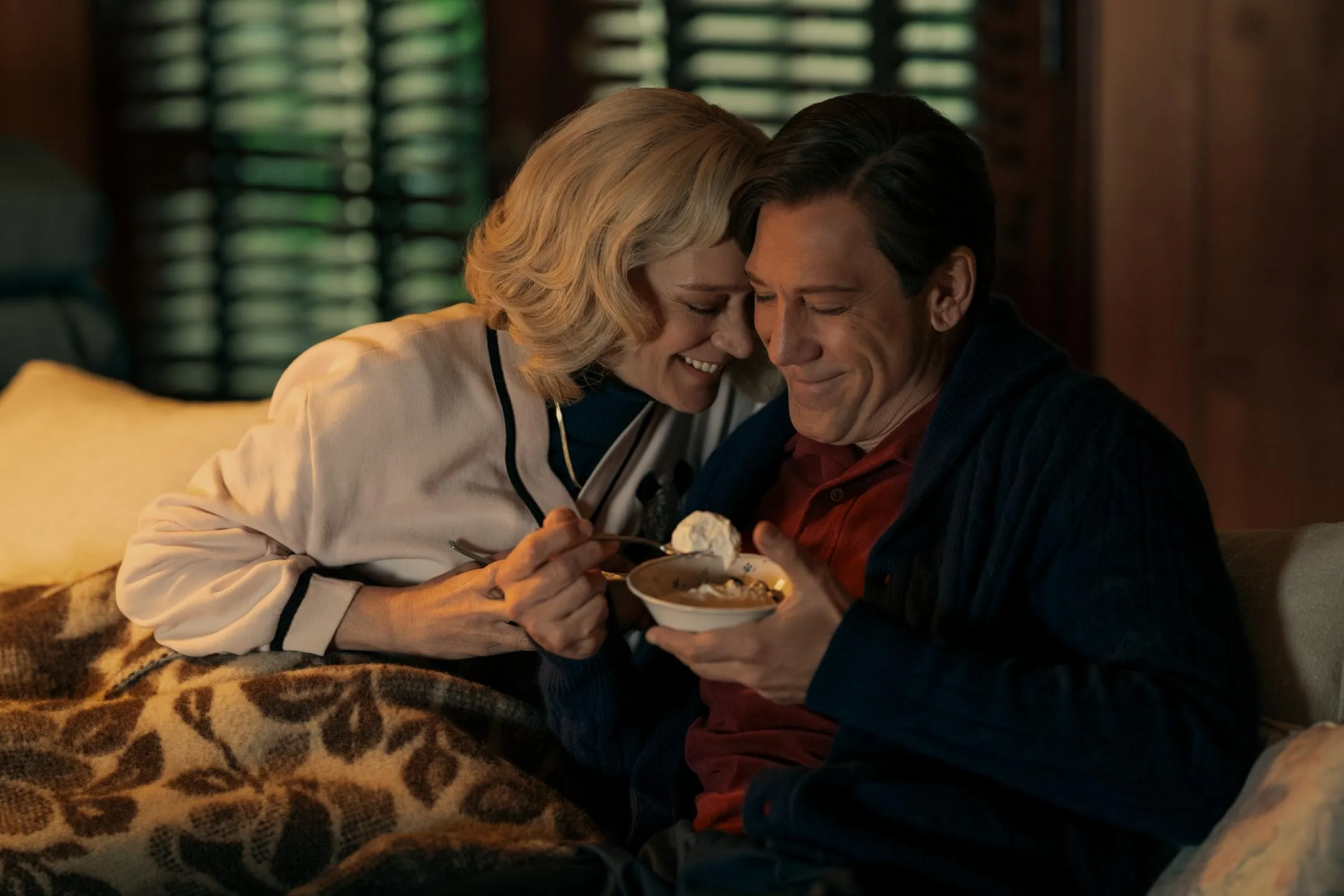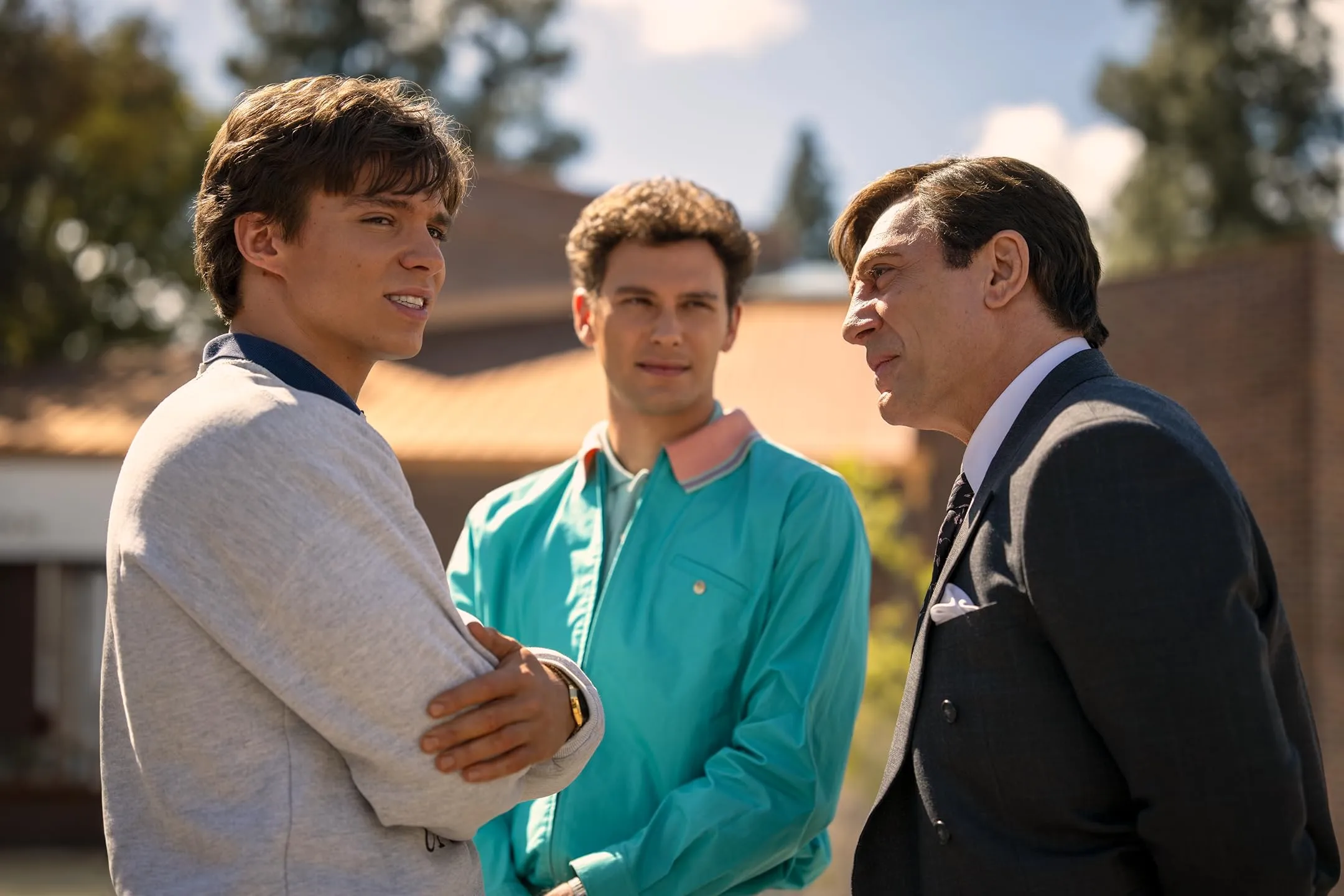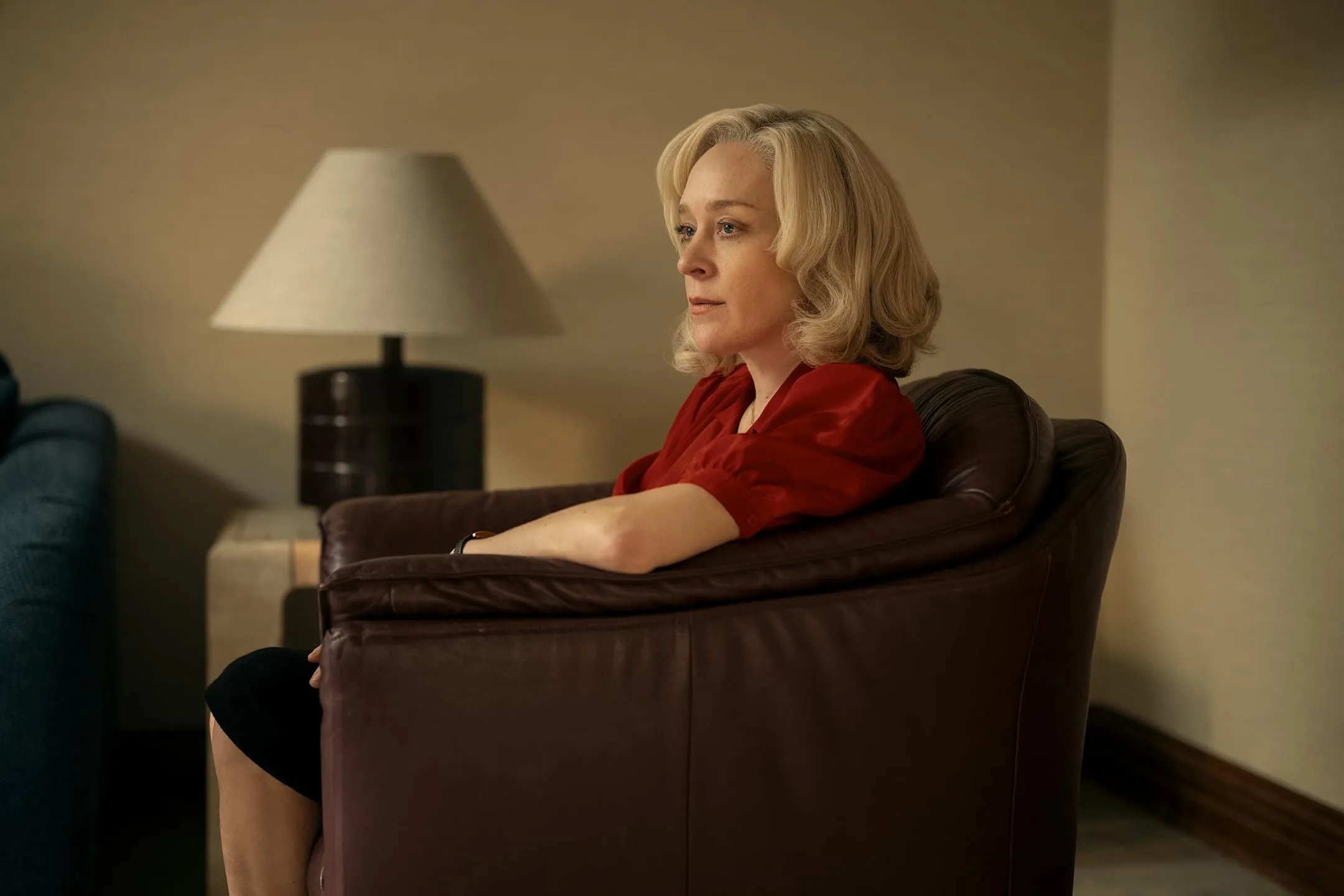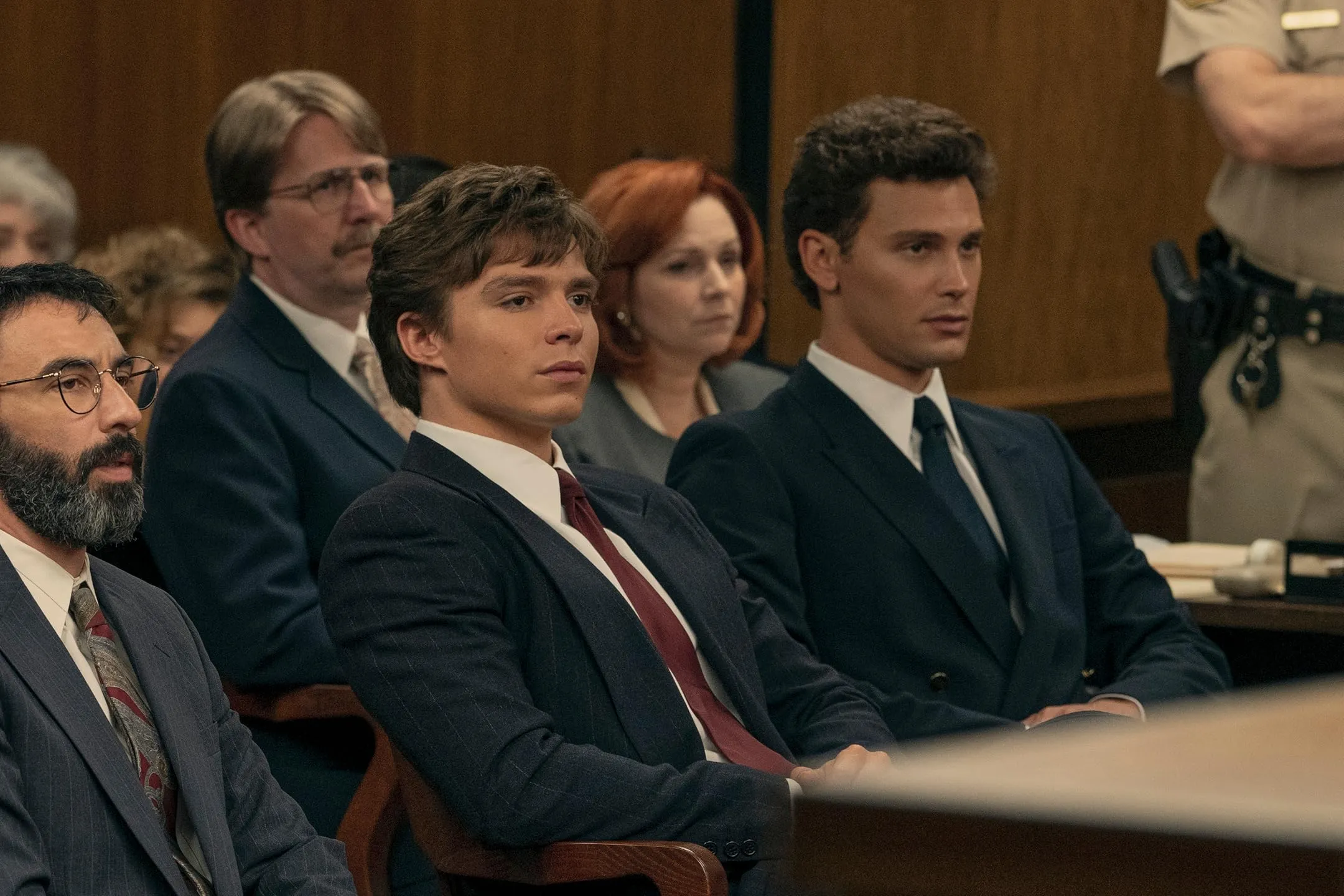The Netflix drama Monsters takes us back to that notorious 1980s murder case involving brothers Lyle and Erik Menendez. We all likely recall the shocking tabloid headlines at the time: two wealthy sons accused of gunning down their wealthy parents in cold blood inside their lavish Beverly Hills home.
Now showbiz maestro Ryan Murphy brings this saga to screens with his signature stylish yet unsettling flair, no doubt hoping we’ll chew on its moral quandaries long after credits roll.
Through nine lengthy episodes, Murphy unpacks the Menendez family history and what may have truly driven these brothers to such a violent act. We relive their privileged yet troubled upbringing, with Javier Bardem unnervingly perfect as the tyrannical father figure.
We watch as young Erik and Lyle fall deeper into darkness, their simmering resentment eventually boiling over on that fateful night. But don’t expect a straightforward whodunnit—Murphy wants us questioning all involved and interrogating society’s obsession with these kinds of salacious scandals.
By the journey’s end, more questions linger than answers. Did abuse shape these boys’ destinies, or were deeper psychopathic urges to blame? How might their tale reflect on our own armchair detective tendencies? Overall, Monsters makes for unsettling yet compelling viewing, superbly performed, and trickier than a standard true crime thriller might have us believe.
Though the path is murky, Murphy seems content simply sharing this eerie ride rather than tying everything in a neat bow. For him and for us, perhaps the mystery itself is what really matters.
Family Secrets Unravelled
Episode 1 wastes little time thrusting us into the murky Menendez story. We’re introduced to brothers Lyle and Erik already on edge, traveling to memorialize their slain parents, Jose and Kitty. Lyle seems controlled, but Erik cracks beneath waves of emotion. Flashes soon relay this wealthy family’s fractured history, with Jose’s domineering presence looming large.
In later episodes, more pieces fit into place. Episode 2 shows Erik struggling in the aftermath, haunted by nightmares of that deadly night. Meanwhile, Episode 3 sees his chilling confession to therapist Dr. Oziel, which unlocks the case. But whose truth is hardest to swallow—the brothers’ claims of self-defense following endless mistreatment or the prosecution’s money motive narrative?
As revelations ripple out, Episode 4 tightens the brothers’ nose as Dr. Oziel contacts Lyle. But many remain unconvinced, given his own questionable actions. Then, in a stunning episode 5 centerpiece, Erik bears his soul to defense lawyer Leslie. In a tour de force single take, actor Koch lays bare a harrowing account of long-buried abuse, the scars of which can never truly heal.
This midseason episode stops many in their tracks, its rawness a far cry from stylistic flourishes elsewhere. But among rollercoaster plot twists and performances that grip through dark subject matter, perhaps the most unsettling realization is how easily tragedy and torment can hide behind facades of affluent normalcy. This nuclear family’s deepest secrets are not so easily buried, their explosive fallout still echoing years later through Ryan Murphy’s compelling, if not entirely comfortable, dramatization.
Powerhouse Performances
This limited series lives or dies by its actors, and boy do these performers deliver. Nicholas Alexander Chavez owns the role of volatile yet charming Lyle. In Chavez’s hands, Lyle buzzes with manic energy one moment and completely unravels the next. We understand how his flashy bravado masks deep wells of lingering pain.
Then there’s Cooper Koch’s astounding turn as troubled Erik. While some may find Erik irritating, Koch ensures we feel only empathy. His nuanced work breathes desperate humanity into even Erik’s darkest acts. When accusations fly during Conrad’s intense interrogation, Koch has us wavering along with the character. It’s a stunning display of emotional acrobatics that rightfully earned this star widespread praise.
But the real standout is Javier Bardem’s peerless villainy as domineering father Jose. With barely constrained menace in his glare alone, Bardem terrifies without overacting. We see how Jose warps the household and everyone in it. And in quieter sequences, Bardem locates shreds of humanity in the man. It makes his monster all the more unsettling, and the abuse allegations against him feel chillingly plausible.
Together, this power trio ensures we remain riveted even through narrative lulls. Their raw intimacy, forged through grueling subject matter, feels painfully authentic. In dissecting this dysfunctional family’s rotted core, the actors spare nothing to burrow beneath façades and find deeper shades of truth. Their triumphs are what transform Murphy’s ambitious serialization from mere scandal tour to a vivid glimpse of hidden horrors lurking within seemingly ordinary lives.
Shifting Moods and Motions
Within Murphy’s telling of this true crime saga, tone takes on a life of its own, shifting through haunting somberness, tension-building dread, and moments bordering on unintentional camp. Episode to episode, viewers are kept on their toes, mirroring the emotional rollercoaster Erik and Lyle surely faced living through this nightmare.
Some scenes are rendered in chilling, austere fashion. Silent stretches intensify the eeriness when brothers quietly stew in their crumbling family unit. Likewise, the cold, sterile settings of police stations and courtrooms amplify unease.
Then attention turns playful yet disquieting. Slapstick pops up in odd places, from Lyle’s toupee tribulations to a shady psychologist dancing alone with crystals. Laden with dark ironies, these beats veer from poignant character insights to unintended humor, leaving viewers uncertain how to feel.
Visually, directors employ an eclectic arsenal. Dynamic shooting thrusts us into the thick of arguments. Others linger intimately on faces, extracting each painful nuance. The iconic single-take confessional amplifies the episode’s unease. Familiar local landmarks immerse us in another unsettling period piece from Murphy’s repertoire.
Through it all, tonal gymnastics mirror the murky moral questions troubling this saga and society’s unrelenting obsession with it. If the brothers’ fates can stir such polar reactions, perhaps resolving wider social issues surrounding abuse and justice feels just as complicated. In pushing viewers off-balance, Monsters reflects how we still wrestle with issues far beyond one disturbed family’s tragic downfall.
Untangling Trauma
This storyline proves a complex web, with trauma at its core. Across episodes, cycles of abuse inflicted upon Erik and Lyle slowly emerge, giving glimpses of the boys’ turmoil.
Witnessed through Erik’s breakdowns and flashbacks, we see how deeply scars can run. Harsh words, violent outbursts, and worse still left psychological wounds hard to mend. As kids faced such terrors within their own home, how could they develop normally?
Naturally, doubts linger. With the case splashed across headlines, distinguishing truth from rumor grew muddied. As conflicting theories swirled, answers remained elusive.
Yet broader issues come into focus. Our fixation with true crime, peeling back each grisly detail, raises questions. By dissecting trauma’s most brutal displays, what do we really gain? And how might intense public scrutiny compound suffering for those still healing?
As fascination with these kinds of stories seems only to intensify, Murphy’s work highlights that society’s reflection may be needed. Perhaps by studying what drives both victims and observers alike to these dark places, compassion can grow and realities can be better understood. But unraveling life’s biggest knots seldom brings easy answers.
When More is Simply Too Much
While the initial episodes captivate with their glimpse inside dark family dynamics, the latter half of Monsters stretches viewer commitment to its limits. Episode 6, seeking to flesh out Jose and Kitty’s backstories, does little to deepen our understanding. Their distressing childhoods emerge as afterthoughts, disrupted by meandering scenes adding no true insight.
Following entries inducing Dominick’s perspective similarly distract without progressing the core narrative. The reporter’s unrelenting disgust towards the brothers, though true to real events, becomes exhausting. Subplots fail to enhance our grasp of how abuse shaped Erik and Lyle’s fates.
Even the courtroom theater, while recreating an essential phase, drags on to wearisome effect. Intricate legal rigor and endless witnesses cloud rather than clarify. What’s meant to raise questions instead numbs the mind.
At nine grueling hours, Monsters tests patience in revisiting old wounds. Its sprawling runtime challenges cohesion, crucial facts lost in unnecessary tangents. A tighter focus on the brothers’ trauma may have balanced empathy with intrigue far more productively.
As Erik’s monologue piercingly notes, cycles of mistreatment lie at this story’s heart. Yet illuminating such darkness required concision, not continuous retreading. For some, less truly could have been so much more.
Loose Threads, Lingering Questions
As the closing credits roll on Monsters’ unsettling retelling, echoes of the Menendez saga will linger long after. At its core lies a family shattered by darkness few could imagine.
Through it all, two brothers stood accused of brutally silencing Jose and Kitty forevermore. But were Erik and Lyle products of their poisoned upbringing, or did deeper malicious urges drive their deadly actions? On these quandaries, the series leaves interpretations open-ended.
While resurrecting this true crime classic through spellbinding performances, Murphy’s dramatization draws both praise and problems. Lengthy scenes probe the brothers’ psyche yet crowd out focus. And dissecting trauma most intimately demands a surer handling than sensationalism.
In the end, more queries arise than answers provided. So the abuse cycle’s impacts remain shrouded as society’s role staring into others’ private hells. As for justice in this world, perhaps the search is what really matters—not facile resolutions, but understanding as elusive as the truth itself. On that frontier, work remains.
The Review
Monsters: The Lyle and Erik Menendez Story
Ryan Murphy's Monsters dissects a notorious family's dysfunctional core with spellbinding performances and brooding directorial flair. By zeroing in on Erik and Lyle's abusive upbringing, certain episodes shine an unflinching light on trauma's lingering scars.
PROS
- Compelling performances, especially from Koch and Bardem
- Intriguing exploration of family dysfunction and abuse impacts
- Evocative 1980s period detail and local atmosphere
CONS
- Overlong runtime weakens narrative focus.
- Tone oscillates between camp and serious ineffectively.
- Exploitative graphic sequences undermine empathy.
- Fails to meaningfully critique true crime consumption





















































